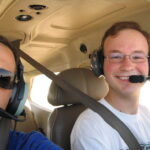
Your Path to the Skies: Private Pilot IFR Training Online
Embarking on the journey to become an IFR-certified private pilot is a bold step toward mastering the skies. The freedom and precision that instrument flying offers can take your piloting skills to new heights. With the advent of online training courses, achieving this advanced certification is more accessible than ever before. Let’s explore what it takes to navigate this path.
Key Takeaways
- Understanding the importance of IFR certification for private pilots.
- Identifying the components of a comprehensive online IFR training course.
- Steps to prepare for and obtain IFR certification through online training.
- Key resources and tools that enhance the online learning experience.
- How to choose the right online IFR course to suit your learning style and goals.
The IFR Certification Landscape
Instrument Flight Rules (IFR) certification is crucial for pilots who wish to fly under any weather conditions, especially when the outside visual references are poor or non-existent. Unlike Visual Flight Rules (VFR), IFR flying relies on instruments to navigate and maintain aircraft control. This certification opens up new possibilities for flight schedules and itineraries, making you a more versatile and capable pilot.
However, achieving IFR certification demands a deep understanding of complex systems and procedures. The training covers everything from interpreting instrument readings to managing in-flight emergencies. It’s rigorous but rewarding, and with the right preparation, it’s an attainable goal.
Choosing the Right Online IFR Course
Selecting an online IFR course is a significant decision. The course should not only prepare you for the FAA Knowledge Test but also ensure you become a proficient and confident instrument-rated pilot. Here’s what to look for:
- FAA Approval: Verify that the course is FAA-approved and provides an instructor endorsement upon completion.
- Comprehensive Content: The course should cover all necessary topics, from navigation aids to flight planning and safety protocols.
- Interactive Elements: Look for courses with interactive modules, quizzes, and simulated flight scenarios to enhance learning.
- Accessible Instructors: Ensure that there are experienced instructors available to answer your questions and guide you through the material.
- Flexibility: The best online courses offer study-at-your-own-pace flexibility, which is essential for balancing training with other commitments.
Remember, the goal is not just to pass the test but to become a competent pilot who can confidently navigate the IFR environment.
Navigating the Course: What to Expect
Once you’ve selected the right course, it’s time to dive in. A structured and well-designed IFR training program will guide you through each step of the process, from the basics of instrument flight to the nuances of cross-country flight planning.
Breaking Down the Curriculum
The curriculum of an IFR training course is extensive, covering a wide range of topics. Here’s a glimpse of what you’ll learn:
- Aerodynamics: Understanding how your aircraft behaves under instrument flight conditions.
- Navigation: Using radio navigation aids, GPS, and other instruments to find your way.
- Flight Instruments: Reading and interpreting the six primary flight instruments for control.
- Weather: Interpreting meteorological data to make informed decisions.
- Regulations: Knowing the rules that govern IFR flight.
- Emergency Operations: Handling unexpected situations with confidence.
Each module will build upon the last, gradually increasing in complexity. By the end of the course, you’ll have a solid foundation in all aspects of IFR flight.
Most importantly, the best online courses mirror the progression of real-world flight training. They start with the basics and gradually introduce more complex scenarios, ensuring that you’re not just memorizing information, but truly understanding it. Because, when you’re in the cockpit, it’s not about recalling facts—it’s about making the right decisions based on your knowledge and skills.
Therefore, when you’re ready to take the leap into IFR training, remember that the journey is as important as the destination. The right course will not only prepare you for the FAA exam but will also equip you with the skills and confidence to fly safely and proficiently under instrument conditions. Choose wisely, and you’ll be well on your way to mastering the skies.
Interactive Online Modules and Their Benefits
Interactive online modules are a cornerstone of effective IFR training. They offer a dynamic learning experience that traditional textbooks can’t match. Here’s why they’re so beneficial:
- Engagement: Interactive elements keep you actively involved in your learning, which helps to reinforce the material.
- Instant Feedback: Quizzes and practice tests provide immediate results, allowing you to identify areas for improvement on the spot.
- Flexibility: You can access these modules anytime, which means you can fit study sessions around your schedule, not the other way around.
- Visual Learning: Many concepts in IFR training are abstract; interactive modules can provide visual representations of these concepts, making them easier to grasp.
By incorporating interactive online modules into your study routine, you’re not just passively absorbing information; you’re actively engaging with it, which leads to deeper understanding and retention.
Simulated Flight Scenarios
Simulated flight scenarios are another key feature of high-quality online IFR courses. These simulations take you through real-world flying situations, allowing you to apply what you’ve learned in a controlled, risk-free environment. Here’s how they help:
- Practical Application: Simulations allow you to practice IFR procedures and decision-making without leaving the ground.
- Risk Management: You can experience and manage in-flight emergencies in a simulation, preparing you for any eventuality in the air.
- Confidence Building: The more you practice in simulations, the more confident you’ll become in your abilities to manage IFR conditions.
These scenarios are invaluable because they bridge the gap between theory and practice. By the time you’re in the cockpit for real, you’ll feel like you’ve been there before.
Achieving Certification: The Process
The road to IFR certification is paved with dedication and hard work. Here’s a breakdown of the key steps in the process:
Preparing for the FAA Knowledge Test
The FAA Knowledge Test is a critical milestone on your IFR journey. To prepare:
- Study: Use your online course materials, focusing on understanding concepts, not just memorizing answers.
- Practice Tests: Take full advantage of practice exams to familiarize yourself with the test format and time constraints.
- Review: Go over any incorrect answers to ensure you understand why you got them wrong.
Preparation is key. When you walk into the testing center, you should feel confident that you’re ready for anything the exam throws at you.
Obtaining the Instructor Endorsement
Before you can take the FAA Knowledge Test, you’ll need an endorsement from a Certified Flight Instructor (CFI). To get this:
- Complete the Course: Finish all the required modules and lessons in your online IFR training program.
- Pass Practice Exams: Many courses require you to pass practice tests with a certain score to qualify for the endorsement.
- Connect with a CFI: Some online courses offer direct access to CFIs who can provide the endorsement upon satisfactory completion of the course.
Once you have your endorsement, you’re one step closer to the final goal: IFR certification.
Logging Required Flight Hours
While online courses are invaluable for knowledge training, you’ll also need to log flight hours with a qualified instructor. Here’s what to expect:
- Flight Time: The FAA requires a specific number of flight hours under IFR conditions. Your online course will outline these requirements.
- Flight Instructor: Work with a CFI who has experience in IFR training to ensure you’re getting the most out of your flight hours.
- Logbook: Keep detailed records of your flights, as you’ll need to present these when you apply for your IFR checkride.
Logging flight hours is not just about meeting a requirement; it’s about gaining the experience and confidence you need to fly safely and proficiently under instrument conditions. With each flight, you’re building the skills that will serve you for a lifetime of flying.
The Tools for Success: Course Resources
Having the right tools can make all the difference in your IFR training journey. These resources are designed to complement your online course material, providing additional support to ensure you grasp and retain the vast amount of information required for IFR certification.
Flashcard Apps: Studying on the Go
Flashcards have long been a staple of effective studying, and digital flashcard apps have taken this to the next level. They allow you to:
- Customize Your Learning: Create your own flashcards with information you find challenging, or use pre-made sets that cover key IFR concepts.
- Study Anywhere: With flashcard apps on your phone or tablet, you can turn any moment into a study session—whether you’re in line at the grocery store or waiting in the lobby of the dentist’s office.
- Track Your Progress: Many apps feature tracking systems that help you focus on areas where you need the most practice.
Flashcard apps are a fantastic way to keep your study momentum going, no matter where you are.
Support Channels: Real-Time Help from Experts
Online IFR courses offer various support channels to provide you with real-time assistance. These can include:
- Live Chat: Get instant answers to your questions from available instructors or support staff.
- Email Support: For more in-depth queries, email support ensures you get a thorough response to your questions.
- Webinars: Participate in live webinars where experts discuss complex topics and answer participant questions.
Having access to expert help when you need it most can be the difference between understanding a challenging concept and feeling left in the dark.
Community Interaction: Learning with Peers
Learning isn’t just about studying; it’s also about interaction. Many online courses foster a community of learners who can share experiences, tips, and encouragement. Benefits include:
- Forums: Engage in discussions with fellow students to gain new perspectives and insights.
- Study Groups: Join or create study groups for collaborative learning sessions, which can be especially helpful before exams.
- Networking: Connect with peers who can become valuable professional contacts in the future.
Being part of a community creates a sense of camaraderie and support that can make your learning experience more enjoyable and effective.
Taking Off: Post-Certification Pathways
Once you’ve achieved your IFR certification, a new horizon of opportunities unfolds. This certification is not just a milestone; it’s a gateway to new adventures and professional pathways.
Benefits of IFR Certification for Private Pilots
IFR certification comes with a host of benefits that can enhance both your personal and professional flying experiences. These include:
- Increased Safety: With the skills to navigate through less-than-ideal weather conditions, you’ll be a safer, more competent pilot.
- Greater Flexibility: IFR certification allows you to fly in a broader range of weather conditions, giving you more freedom to fly when you want.
- Enhanced Skills: The precision and discipline required for IFR flying will improve your overall piloting abilities.
- Professional Opportunities: IFR certification is a stepping stone to advanced ratings and career opportunities in aviation.
Whether you’re flying for pleasure or pursuing a career in aviation, IFR certification is a powerful tool in your pilot’s toolkit. It opens up the skies, allowing you to fly with confidence, no matter the weather. With your newfound certification, the sky is not the limit—it’s just the beginning.
Continued Education Options
After conquering the IFR certification, the learning doesn’t stop there. Aviation is an ever-evolving field, and staying current is essential. Continued education options include:
- Advanced Ratings: Pursue additional ratings like Multi-Engine or Certified Flight Instructor (CFI) to broaden your piloting capabilities.
- Recurrent Training: Regularly refresh your knowledge and skills to stay sharp and maintain proficiency.
- Safety Seminars: Attend workshops and seminars focused on aviation safety to learn about new procedures and technologies.
- Online Webinars: Participate in online webinars covering diverse topics, from new regulations to emerging trends in aviation.
Continued education not only enhances your safety and proficiency but also keeps you connected with the aviation community, ensuring you’re always at the forefront of the industry.
Transitioning to Commercial Pilot Training
For many, IFR certification is a stepping stone towards a career in aviation. Transitioning to commercial pilot training is a natural next step. Here’s how to make the move:
- Meet the Requirements: Ensure you meet the FAA’s age, medical, and flight hour requirements for commercial pilot certification.
- Log Additional Hours: You’ll need to accumulate more flight hours, including solo, cross-country, and night flying.
- Advanced Maneuvers: Master complex maneuvers and operations that are part of the commercial pilot syllabus.
- Pass the Exams: You’ll need to pass another FAA written test, as well as a practical exam with a designated pilot examiner.
Moving to commercial pilot training opens up career opportunities, from flying for airlines to charter services, and requires a higher level of skill and dedication.
Frequently Asked Questions (FAQ)
What prerequisites are needed for Online IFR Training?
To start online IFR training, you’ll need:
- Private Pilot License: You must already hold a Private Pilot License (PPL).
- Medical Certificate: Possess a current FAA medical certificate.
- Basic Flight Experience: Have a certain amount of flight hours, as specified by the FAA, including some pilot-in-command time.
These prerequisites ensure that you have the foundational knowledge and skills necessary to tackle the complexities of IFR flying.
How does online training compare to traditional in-person training?
Online training offers flexibility and convenience that in-person training can’t match. You can study at your own pace and on your own schedule. However, in-person training provides direct interaction with instructors and immediate hands-on experience. Both methods have their merits, and many pilots find a blended approach to be most effective.
What is the duration of the online IFR course?
The duration of an online IFR course varies depending on the provider and your personal schedule. Typically, you can expect:
- Self-Paced Learning: Most courses are designed to be completed at your own pace, with access ranging from a few months to a year.
- Consistent Study: With regular study, many students complete the course within 3-6 months.
- Flight Hours: Remember, you’ll also need to log flight hours, which can affect the total time to certification.
The key is to maintain a consistent study routine and stay engaged with the material, ensuring you’re ready for the FAA Knowledge Test and practical exam.
How do I know if an online IFR course is FAA approved?
To ensure that an online IFR course meets the standards set by the Federal Aviation Administration (FAA), you should:
- Check the Course Provider: Verify that the course provider is reputable and has a history of successful student outcomes.
- Look for FAA Approval Statements: Accredited courses will often advertise their FAA approval status and provide a reference number or certificate.
- Confirm with the FAA: If in doubt, you can always contact the FAA directly to confirm the approval status of a course.
FAA-approved courses are designed to comply with the regulatory requirements and provide the necessary knowledge for the IFR Knowledge Test and practical exam.
What happens if I fail the FAA Knowledge Test?
If you don’t pass the FAA Knowledge Test on your first try, don’t be discouraged. Here’s what you can do:
- Review the Test Report: The FAA will provide a report highlighting the areas where you need improvement.
- Study: Use the report to focus your studies on the areas where you fell short.
- Retake the Test: You can retake the test after 14 days, giving you time to study and strengthen your knowledge.
Failing the test is not the end of your IFR journey. It’s an opportunity to learn from your mistakes and come back even stronger.
In conclusion, the journey to becoming an IFR-certified private pilot is challenging but immensely rewarding. Online IFR training courses have made this advanced certification more accessible, offering flexibility and a wealth of resources to support your learning journey. By choosing the right course, engaging fully with the curriculum, and utilizing the tools and resources available, you’ll be well-prepared to pass the FAA Knowledge Test and excel in the practical exam.
Remember, the path to IFR certification is not just about passing tests; it’s about becoming a safer, more proficient pilot. It’s about gaining the confidence and skills to navigate the skies under any conditions. With dedication and the right approach to your training, you’ll join the ranks of competent instrument-rated pilots, ready to take on new challenges and explore the vast realm of aviation.
So, take that first step with confidence. Your path to the skies is waiting, and the view from above is worth every moment of effort you put into reaching it. Blue skies and tailwinds to you, future IFR pilot!






Leave a Reply